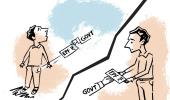Keep in mind your asset allocation, risk appetite and investment horizon when selecting your tax-saving plans, suggests Sanjay Kumar Singh.

If you are a corporate employee, then in the first or second week of February your Accounts Department will ask for proof of tax-saving investments made during the financial year.
Ideally, you should have begun investing for tax saving from April.
If you have not done so, it is still not too late.
But you must give a lot of thought, or take the help of a financial advisor, when choosing your tax-saving instruments.
Insurance agents and bank relationship managers go all out to rack up sales during these three months.
The products they push are likely to be the ones that earn them the highest commissions, not those that are best for you.
So, do the due diligence and do not succumb to their sales pitch.
The primary mantra investors should follow is to make sure their tax-saving investments are in sync with their overall financial goals.
"At the outset, every individual must identify his financial goals-- short-, medium- and long-term. Once you have done this, combine investments with tax saving, while staying in line with your risk appetite," says Archit Gupta, founder and CEO, ClearTax.
Check insurance needs first
To ensure that the family's financial goals and lifestyle are not affected by the breadwinner's early demise, buy adequate life insurance.
Any person who has financial dependents (like parents, sibling, spouse or children) or liabilities (home loan, car loan, etc) must buy term insurance.
Use a Human Life Value calculator available online to estimate how much life insurance you need, or ask an advisor.
A deduction is available on life insurance premiums under Section 80C.
Don't buy an insurance-cum-investment plan to meet your protection needs as the coverage they offer is likely to be inadequate compared to what you require.
Next, check whether you have adequate health insurance.
In metros, a Rs 10 lakh family floater is a must for a nuclear family, while in smaller towns Rs 5 lakh may suffice.
"Those who are not senior citizens get a deduction on health insurance premium up to Rs 25,000 under Section 80D. Senior citizens get deduction of up to Rs 50,000. If you pay your parents' health insurance premium, you can claim a total deduction of up to Rs 75,000," says Deepesh Raghaw, founder, PersonalFinancePlan.in, a Sebi-registered investment advisor.
Invest according to asset allocation
Next, check the asset allocation of your existing portfolio to see where there is a deficit.
"If your portfolio has become underweight on equities, consider a product like equity-linked savings scheme (ELSS)," says Renu Maheshwari, Sebi-registered investment advisor, and co-founder and principal advisor, Finscholarz Wealth Managers.
On the other hand, if your portfolio is underweight on debt, consider Voluntary Provident Fund (VPF).
You can invest up to 100 per cent of basic salary plus dearness allowance in it.
It offers the same interest rate as the Employees' Provident Fund (EPF) -- 8.65 per cent currently.
Another attractive instrument on the debt side is Public Provident Fund (PPF), which at present pays an interest rate of 7.9 per cent.
Senior citizens can also opt for the Senior Citizens Savings Scheme (SCSS), which comes with a government guarantee and offers an interest rate of 8.6 per cent, paid out quarterly.
Check investment horizon and liquidity needs
If you have an investment horizon of seven years or more, invest in a pure equity product like ELSS.
Also pay heed to when you will need your money back.
If you need the money in the short term, it would not be a good idea to invest it in a unit-linked investment plan.
The earliest you can withdraw your money from them is after five years.
EPF/VPF and PPF are also long-term, relatively illiquid products that offer limited access to your money in the interim.
In EPF/VPF, you can withdraw a part of your money prematurely only under specified circumstances--in case of grave illness, for child's education or marriage, etc.
ELSS comes with the shortest compulsory lock-in of three years.
Factor in your risk appetite
Conservative investors who cannot stomach the volatility of equities will be better off opting for a debt or hybrid product.
The National Pension System (NPS) allows you to choose from varying levels of equity and debt.
"Those who want to invest towards retirement and have some equity exposure may consider NPS," says Gupta.
Maheshwari recommends investing in NPS to avail of the additional tax deduction of Rs 50,000 under Section 80CCD(1B).
Steer clear of most insurance-cum-investment products
If you approach a neighbourhood insurance agent for a tax-saving product, you are most likely to be sold a traditional plan such as moneyback, whole life, or endowment.
There are several issues with them.
One, they have an insurance component.
"If you do not need insurance, or already have adequate insurance, you will unnecessarily pay a mortality charge in them.
And this charge is higher for older people," says Raghaw.
With a part of the premium going into paying the mortality charge, the returns of these plans come down.
Moreover, they invest mostly in bonds.
Due to both these reasons, their returns rarely exceed 4-5 per cent.
"If you are investing for, say, 25-30 years, you should ideally enter an equity product that could potentially offer a double-digit return.
Returns from insurance-cum-investment products are low.
That can make all the difference between whether you retire rich or poor," says Maheshwari.
Exiting these products can be expensive.











